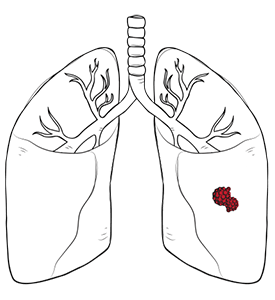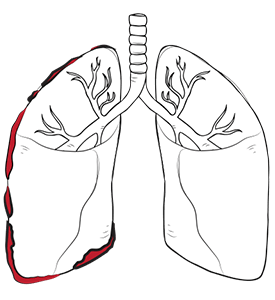

Mesothelioma is cancer that arises in the membrane lining the lungs or the abdomen. Mesothelioma is malignant, meaning it spread and increases harm over time, as opposed to benign, meaning they do not metastasize.
The lining in the lungs and chest area is known as pleura, and if mesothelioma is contracted in the lungs, it is known as malignant pleural mesothelioma (MPM), describing both its location and the type of cancer. More than 75 percent of mesotheliomas are pleural mesotheliomas.
Malignant pleural mesothelioma is an aggressive type of cancer that requires a range of treatments. Asbestos exposure is the number one cause of MPM; almost 80 percent of people with the cancer have been in contact with asbestos. One percent of people with mesothelioma inherit the genetic risk factor due to a mutated BAP1 gene.

Mesothelioma is not currently curable, but it can be treated to extend life and manage symptoms. Treatment options include surgery, chemotherapy, immunotherapy, and multimodal therapies, which can help patients achieve long-term remission and improve their quality of life. Surgery is often necessary for malignant pleural mesothelioma (MPM) to remove the cancer from the pleura before proceeding with other strategies to fight the cancer.
Patients with MPM require a multidisciplinary approach to treatment involving specialists in surgery, oncology, and radiotherapy. Mesothelioma surgery may be necessary to reduce the tumour burden; this must be followed with adjuvant chemotherapy and/or radiotherapy to keep cancer in remission.
The choice of treatment depends on the severity of the mesothelioma cancer. While there is no single, definitive treatment for MPM, there are various treatment modalities to offer the best patient outcomes available.
Surgery is usually the first step for patients with malignant pleural mesothelioma, though it depends on the stage of the cancer. The surgery is performed to debulk the tumour and reduce the overall amount of cancer within the chest. This is either with the intention of eradicating the cancer, possibly in combination with chemotherapy and/or radiotherapy, or in cases of palliative care, to enhance quality of life.
Patients with MPM primarily confined to one side of the chest can undergo extrapleural pneumonectomy. This surgical operation will remove the diseased lung, the lining of the chest wall, and part of the diaphragm. The human body is designed to live with a single lung as opposed to both, making this surgical intervention a viable option.
Not all patients can undergo an extrapleural pneumonectomy as it is an extensive surgery. Instead, they can undergo a radical pleurectomy and decortication, which only removes the pleura lining the chest cavity and the lung, as opposed to the entire lung. This option is now becoming the standard treatment for malignant pleural mesothelioma as it preserves the effected lung.
The decision to undergo surgery and the specific surgical approach should be made after careful consideration and consultation with a team of experienced mesothelioma specialists.
Surgery can help to relieve malignant mesothelioma symptoms such as chest pain and difficulty breathing. It can also extend the patient’s lifespan by reducing the harm the cancer causes. It’s important to note that surgery is not enough to tackle this form of cancer and requires chemotherapy and/or radiation therapy to have the best outcomes post-surgery. The specific combination of approaches depends entirely on your condition and will be determined by a team of experts.
Unfortunately, no. There is no way to ‘cure’ malignant pleural mesothelioma. However, there are options to treat it, to both extend the patient’s lifespan and enhance their quality of life. Surgery is usually the first step, followed by radiation therapy and/or chemotherapy. The ultimate aim of mesothelioma treatment is to improve the quality of life for the patient, and so the approach will be determined accordingly.
Mesothelioma cannot be cured, even if caught early. While early detection can improve treatment outcomes and extend life expectancy, there is no cure for the disease.
Exposure to asbestos, a group of minerals composed of microscopic fibres — commonly used in the construction, mining, milling and manufacturing — is the main cause of mesothelioma. If you work in these industries, it is important to be aware of your lung health and seek medical attention if you experience a persistent cough or any other respiratory problems. Visit your doctor if you have a prolonged cough or other respiratory issues. Symptoms of mesothelioma include chest pain, shortness of breath, dry cough, and fatigue. If you experience these symptoms, it is important to visit a doctor right away. Early mesothelioma diagnosis and treatment are essential for a positive outcome.
DISCLAIMER: The information provided on this website is for general informational purposes only and is not intended as a substitute for professional medical advice, diagnosis, or treatment. The use of this website does not create a doctor-patient relationship and no medical advice should be inferred or assumed. It is the user’s sole responsibility to seek the advice of their healthcare professionals for any medical concerns they may have and the user should not disregard, or delay, prompt medical advice for any such condition.
Neumark Lung and Chest Surgery Centre benefits from the expertise of a multidisciplinary team led by Dr Harish Mithiran, senior consulting thoracic surgeon at Gleneagles Hospital and Mt Alvernia Hospital.
Neumark is a lung and chest specialist centre with access to leading treatment modalities to achieve the best possible outcomes for lung disease and preventative patient screening.
Our foremost priority is to treat your condition as effectively as possible. Schedule a private consultation today; complete the form below, call, +65 6908 2145; WhatsApp, +65 9726 2485; or email, info@neumarksurgery.com.
Gleneagles Medical Centre
6 Napier Road
#02-09 Gleneagles Medical Centre
Singapore 258499
Mount Alvernia Hospital
820 Thomson Road
#06-07 Medical Centre A
Singapore 574623